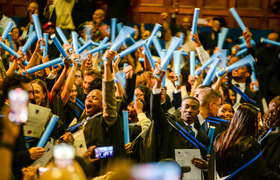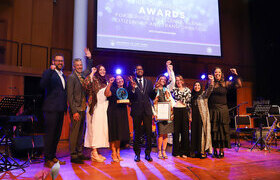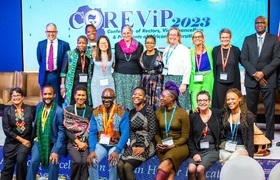“Cooperation over competition”
24 October 2025 | Story Nobhongo Gxolo. Photo Supplied. Read time 10 min.
The University of Cape Town (UCT) brought its own heat to Saudi Arabia’s Autumn where scorching temperatures averaged 33°C. In a historic moment, UCT was announced the first ever African hosts of the Times Higher Education (THE) World Academic Summit (WAS) in 2026, co-hosting with the University of Bristol (UoB). While additionally, clinching the regional rankings for the (THE) World University Rankings (WRU) as Africa’s top university.
The 2025 THE WAS held from 7 to 9 October in Thuwal, saw almost 700 delegates at the impressive, high-tech King Abdullah University of Science and Technology (KAUST) campus. Attendees included thought leaders and influential change-makers in the higher education sector – vice-chancellors and chancellors, presidents, deputy vice-chancellors, directors, chief executives and business leaders – convening to explore how higher education, industry and policymaking might collaborate. Aiming to leverage positive change within local, national and international communities through their influence and the connections made in the space.
The beginning
KAUST PhD candidates; Salma Alsinan, at the Earth Science and Engineering Department and Abubakar Abubakar, in the Chemical Engineering Programme, were the 'Opening ceremony’ MCs. Walking the audience through the musical intro, Alsinan premised the cultural musical item of drumming and singing as a tradition carried across generations, “in the same way that universities safeguard heritage [while ensuring] knowledge and culture continue to inspire new forms of expression”.
Abubakar referenced the next musical item performed by a student whose ventriloquy alternated between a sweet tenor and a bass beatbox. Described as bold, contemporary and disruptive this spoke to “the spirit of innovation and collaboration. Just as a single rhythm can extend into infinite possibilities – universities fuel creativity, drive entrepreneurship and generate economic growth that sustains communities and nations”.
Alsinan described the piano recital that followed as a scaffolding of notes into harmony – collaboration. “We need to work together across disciplines – across borders – so we can advance sustainable solutions all the way from energy and food security, to health and climate resilience.”
The performances were set to reflect the summit themes as interpreted by the mission-driven KAUST; a university honouring heritage, embracing innovation and transforming knowledge into impact.

UCT at the summit
Vice-Chancellor (VC), Professor Mosa Moshabela, addressed the audience in two sessions; ‘Interdisciplinary solutions for global health challenges’ and the ‘Closing session: Summit reflections and future directions’.
Moderated by THE’s Research and Science Reporter, Jack Grove, the first session delved into the world’s pressing health issues across national and disciplinary borders – asking the panel if global responses are keeping up.
Panellists Dr Vivek Goel, University of Waterloo president and VC and Professors Timothy Anake, Covenant University VC, Deborah McNamara, Royal College of Surgeons in Ireland’s president and Professor Moshabela offered views on how universities are enabling cross-sector collaboration between medicine, engineering and policy to address global health inequities.
Leveraging the 4-P funding model
Moshabela referred to the 4-P model of Public-Private-Philanthropic-Partnership as a key collaboration approach in achieving shared goals, including access to diverse income. Specifically, he noted that philanthropy has been a particularly helpful sector in catalysing the relationship between the university, governments, other funders and the private sector.
Grove followed up saying that with UCT being considered a key player in the space with its work recognised globally, did the VC anticipate more funding cuts from the United States impacting the nature of institutional partnerships? So, evolving them towards charity and institutions working more in concert rather than relying on big agencies.
We are trying to focus on the bigger societal questions we should be addressing together rather than competing.
Moshabela acknowledged the danger of UCT having placed its eggs in one basket, having previously noted that the university receives the most funding from the National Institutes of Health outside of North America. “In terms of scale-of-funding we’re not necessarily going to have one source that can replace the amount of funding we got from the NIH. But, by spreading our partnerships we can achieve similar results.
“We are strengthening our partnerships in the Middle East, in Asia, across the globe. We are looking at new donors coming through. We are also putting pressure on our government to invest a lot more in research.”
Universities as champions of sustainable development
The VC takes UCT’s role as a convener creating space for peer universities seriously. In part, this responsibility is a recognition of the university as a leading higher education institution on the continent.
“Between universities we are adopting the principle of ‘cooperation over competition’. For a long time we were competing for the same sources of funding. Even when we are asking questions, we are trying to focus on the bigger societal questions we should be addressing together – rather than competing.”
An example of this deliberate united effort was when in 2024, the Department of Science, Technology and Innovation (DSTI), in partnership with the National Research Foundation (NRF), approved the establishment of the DSTI-NRF Institute for the Preparedness and Prevention of Pandemics (IP3). A multi-institutional and interdisciplinary research institute where UCT collaborated with nine national universities, in partnership with government, civil society and industry.
A space to connect and coact
Moshabela’s second session was moderated by THE Chief Global Affairs Officer, Phil Baty. On stage was also KAUST president, Sir Edward Byrne, as the outgoing host.
Acknowledging this as his first visit to Saudi Arabia, Moshabela said: “It’s been incredible. The hospitality and generosity from the people here – in how they have treated us, welcomed us and engaged with us… It helps our carrying a story with us as we go back to our corners of the world.”
We need to think about how we home in on and expand these partnerships globally. How we reconfigure them.
His interest was piqued by the conversations emphasising innovation. Exploring the missions, functions and the contributions of the university. Recognising the role of the university as shifting beyond traditional teaching and learning and research and evolving to ask: How do we impact the economy, countries and regions, and national priorities?
“I’ve also been struck by the conversations around collaborations and partnerships and the importance of that. It makes sense in the kind of environment and world that we are in geopolitically,” he said. “We need to think about how we home in on and expand these partnerships globally. How we reconfigure them. And we have to be agile as universities in doing that.”
For Moshabela, the role of universities in diplomacy and becoming agents of peace as well as how these institutions engage globally, is critical. “I’ve been struck by how [unfolding] conversations suggest universities can play a better role in science and academic diplomacy and contribute to diplomacy more generally. Where I come from, I don’t think we’ve been holding that role high up in terms of what our contribution could be.
“Finally, the conversations around values, trust, kindness and also conversations around culture have struck a chord – I think they’re very important,” he offered.
The ending
The second half of the ‘Closing session’ was dedicated to an important announcement. Light-heartedly Phil Baty quipped: “The choice of panellists for this session was very carefully thought through. Maybe it’s the worst kept secret in the room, but we’re really pleased and thrilled to announce that the 2026 World Academic Summit is going to be in Africa for the first time. It’s going to be a collaboration between the University of Cape Town and the University of Bristol.” Ushering in the news was the song, ‘Africa’ by Toto – a nationally recognised quintessential capturing of the country’s local flavour.
Professor Michele Acuto, pro-vice chancellor: Global Engagement at UoB with Moshabela on stage, represented the incoming hosts. This moment symbolised and celebrated an ongoing strategic partnership between the two universities, with the first Memorandum of Understanding signed on 22 July 2019.

The VC’s ‘Welcome to Cape Town’ was met with resounding applause. “Thank you very much, Phil. It’s very exciting for us to be hosting the summit on the continent for the first time. I don’t think we are going to compete with KAUST. But we do have a rich culture in Cape Town and in South Africa and on the continent that we would like to share with all of you – all the university leaders from across the world.
“There will be plenty of other university leaders from South Africa… from the continent, who are going to be there to share their experiences and lessons. And they too would very much appreciate hearing your experiences from around the globe. The ways in which you are overcoming some of the shared problems we are all facing as university leaders across the world. Especially, given the current state of the world that we are in and navigating. But also, an opportunity to meet and form collaborations and networks.”
He spoke about the power of science in adversity and the responsibility higher education has to young people whose “futures we feel responsible for”.
Having earlier mentioned the Africa Charter for Transformative Collaborations as an exemplar of the working relationship between UoB and UCT, together with the University of South Africa (UNISA), Professor Acuto had said: “That is exactly the kind of spirit [that’s needed]; to rethink academia – and the bare bones of academia… We’re working with how you do research – how we decolonise research itself.”
To this he now added: “One of the things that have been crucial to that partnership [between UCT and UoB] is that it’s not just in Africa or in South Africa or in Cape Town – it’s that it is with Africa.” Importantly, it is a partnership that has been built on the pillars of kindness and trust.
 This work is licensed under a Creative Commons Attribution-NoDerivatives 4.0 International License.
This work is licensed under a Creative Commons Attribution-NoDerivatives 4.0 International License.
Please view the republishing articles page for more information.



















